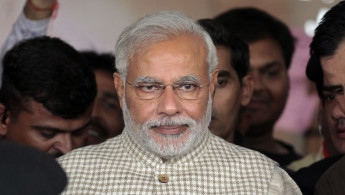Narendra Modi says India can make Pakistan 'bite the dust' in 10 days
Indian Prime Minister Narendra Modi has said he can make Pakistan 'bite the dust' in a week.
2 min read
Modi had fighting words for Pakistan [Getty]
India is now capable of making neighbouring Pakistan "bite the dust" in less than 10 days in any new war, Prime Minister Narendra Modi has said.
The nuclear-armed neighbours have fought three wars and last February came close to a fourth with tit-for-tat airstrikes sparked by an attack on Indian troops in Kashmir.
Modi is under pressure after weeks of ongoing protests against a new citizenship law, a slowing economy and the prospect of losing the latest in a string of state elections in New Delhi next month.
"Pakistan has already lost three wars. Our armed forces will not take more than 7-10 days to make Pakistan bite the dust," Modi said in a speech to military personnel on Tuesday.
His comments follow last year's incident when an Indian fighter jet was shot down - and the pilot captured - by Islamabad after a rare aerial engagement.
Modi went on to say that India's new prowess was thanks to what he called "youthful thinking".
He said that Indian strikes against what New Delhi said were militants in Pakistan-administered Kashmir and inside Pakistan proper in 2016 and last year were evidence of this.
"This is 'youthful thinking'. We carry out surgical strikes and take on terrorists in their homes," Modi said.
India and Pakistan have fought three wars: in 1947, 1965 and 1971, as well as in 1999 during the so-called Kargil Conflict.
Modi said that Pakistan continues to wage a "proxy war" against India by backing militants in Indian-administered Kashmir where tens of thousands of people have died in recent decades.
Kashmir has been divided between India and Pakistan since Independence from Britain in 1947. In August Modi's government stripped Indian Kashmir of its partial autonomy.
The citizenship law
Last week India's Supreme Court rejected demands to suspend the implementation of a new citizenship law widely condemned as discriminatory against the country's 200 million-strong Muslim minority.
The court has given Prime Minister Narendra Modi's government another four weeks to respond to the more than 200 petitions brought against the controversial amendment which came into effect on 10 January.
Heading a three-bench panel on Wednesday, Chief Justice Sharad Arvind Bobde said that only a full constitutional panel of five judges could rule on the matter.
"We will give you four weeks to file reply to all petitions," Bobde told the government's top lawyer, according to Reuters.
The new law opens a path towards citizenship for religious minorities from three neighbouring countries but does not include Muslims.
The nuclear-armed neighbours have fought three wars and last February came close to a fourth with tit-for-tat airstrikes sparked by an attack on Indian troops in Kashmir.
Modi is under pressure after weeks of ongoing protests against a new citizenship law, a slowing economy and the prospect of losing the latest in a string of state elections in New Delhi next month.
"Pakistan has already lost three wars. Our armed forces will not take more than 7-10 days to make Pakistan bite the dust," Modi said in a speech to military personnel on Tuesday.
His comments follow last year's incident when an Indian fighter jet was shot down - and the pilot captured - by Islamabad after a rare aerial engagement.
Modi went on to say that India's new prowess was thanks to what he called "youthful thinking".
He said that Indian strikes against what New Delhi said were militants in Pakistan-administered Kashmir and inside Pakistan proper in 2016 and last year were evidence of this.
"This is 'youthful thinking'. We carry out surgical strikes and take on terrorists in their homes," Modi said.
India and Pakistan have fought three wars: in 1947, 1965 and 1971, as well as in 1999 during the so-called Kargil Conflict.
 |
| Kashmir has been claimed by Pakistan and India [Getty] |
Modi said that Pakistan continues to wage a "proxy war" against India by backing militants in Indian-administered Kashmir where tens of thousands of people have died in recent decades.
Kashmir has been divided between India and Pakistan since Independence from Britain in 1947. In August Modi's government stripped Indian Kashmir of its partial autonomy.
The citizenship law
Last week India's Supreme Court rejected demands to suspend the implementation of a new citizenship law widely condemned as discriminatory against the country's 200 million-strong Muslim minority.
The court has given Prime Minister Narendra Modi's government another four weeks to respond to the more than 200 petitions brought against the controversial amendment which came into effect on 10 January.
Heading a three-bench panel on Wednesday, Chief Justice Sharad Arvind Bobde said that only a full constitutional panel of five judges could rule on the matter.
"We will give you four weeks to file reply to all petitions," Bobde told the government's top lawyer, according to Reuters.
The new law opens a path towards citizenship for religious minorities from three neighbouring countries but does not include Muslims.





 Follow the Middle East's top stories in English at The New Arab on Google News
Follow the Middle East's top stories in English at The New Arab on Google News
![Israeli forces ordered bombed Gaza's Jabalia, ordering residents to leave [Getty]](/sites/default/files/styles/image_330x185/public/2176418030.jpeg?h=a5f2f23a&itok=_YGZaP1z)

